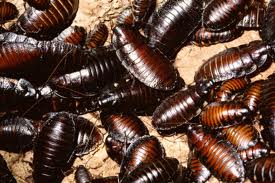Unpleasant though the cockroaches are, biologists say they are essential of the earth’s critical ecosystem.
They are also important food for many other creatures. With the Earth’s 5,000 to 10,000 cockroach species available at hand they are an important source of food for many birds and small mammals like mice and rats.
In turn, these predators are themselves prey to many other species like cats, coyotes, wolves, amphibians, reptiles, as well as eagles and other birds of prey.
According to Srini Kambhampati, professor and chair of the biology department at the University of Texas at Tyler, the disappearance of cockroaches would play havoc with the nitrogen cycle.
Professor Kambhampati, a leading expert on roaches, told the Huffington Post: ‘Most cockroaches feed on decaying organic matter, which traps a lot of nitrogen.
‘Cockroach feeding has the effect of releasing that nitrogen (in their feces) which then gets into the soil and is used by plants. They are essential to our planet for converting nitrogen into fertilizer.
‘Extinction of cockroaches would have a big impact on forest health and therefore indirectly on all the species that live there,’ according to Prof. Kambhampati.
Although there’s not much chance of a cockroach extinction level event happening any time soon.
Any cut to the number of roaches would thus have a cascading effect on the well being of all these species that could have a devastating effect on wildlife across the world.
Meanwhile, British scientists from the University of Nottingham in the UK say that the brain and nervous system of the cockroach hold nine molecules with powerful antibiotic properties that are toxic to super-bugs which are now becoming resistant to mainstream drugs.
British scientists hope that the cockroach, may hold a promising antibacterial cure.
Simon Lee, a postgraduate researcher was not surprised that cockroach could naturally secrete their own antimicrobial drugs because they lived in unsanitary and unhygienic environments where different types of bacteria thrive.
It is but logical that they have developed ways of protecting themselves against micro-organisms, Lee said.
Research is currently underway to test the potency of these anti-bacterial molecules against a variety of emerging super-bugs such as Acinetobacter, Pseudomonas and Burkholderia.
